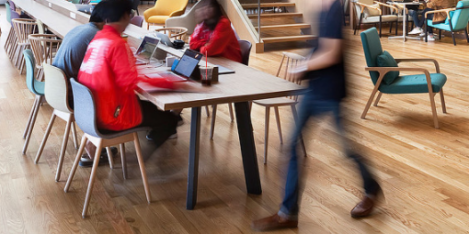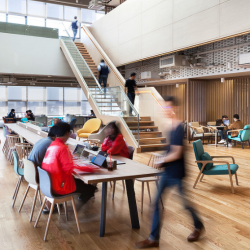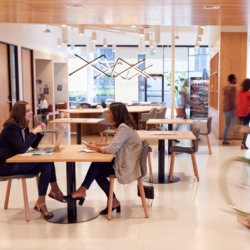November 24, 2020
Digital skills gap poses major economic threat, Microsoft study claims
 The UK’s digital skills gap could pose a risk to economic recovery, new research from Microsoft claims, with over three-quarters of UK leaders citing a large digital talent pool as essential to driving UK competitiveness. The study, Unlocking the UK’s potential with digital skills, was conducted in partnership with Dr Chris Brauer at Goldsmiths, University of London to assess the UK’s skills gap and provide practical guidance for organisations on how to tackle it. It predicts the rise of a “Next Gen Worker” that is empowered by low-code and no-code technology, but also finds that a failure to embrace technological skills could leave companies struggling to compete on the global stage. (more…)
The UK’s digital skills gap could pose a risk to economic recovery, new research from Microsoft claims, with over three-quarters of UK leaders citing a large digital talent pool as essential to driving UK competitiveness. The study, Unlocking the UK’s potential with digital skills, was conducted in partnership with Dr Chris Brauer at Goldsmiths, University of London to assess the UK’s skills gap and provide practical guidance for organisations on how to tackle it. It predicts the rise of a “Next Gen Worker” that is empowered by low-code and no-code technology, but also finds that a failure to embrace technological skills could leave companies struggling to compete on the global stage. (more…)









 A new white paper claims that while supplier codes of conduct are important, they are ineffective if their requirements are not met with actions to bring about transparency. To be effective, codes of conduct should support an authentic determination to embed company values and to foster strong business relationships that encourage honest communication and transparency that include monitoring the effectiveness.
A new white paper claims that while supplier codes of conduct are important, they are ineffective if their requirements are not met with actions to bring about transparency. To be effective, codes of conduct should support an authentic determination to embed company values and to foster strong business relationships that encourage honest communication and transparency that include monitoring the effectiveness. 
 Poise by Bisley is part of the new Belong collection, which has been developed to transcend both the traditional office and homeworking environments. The Poise range consists of a variety of desking and table options, which can either be used as stand-alone pieces of furniture or sit together to form a cohesive office setting. Calling on Bisley’s heritage in workplace innovation, all have been designed in response to the events of 2020, seamlessly adapting to fit either the home or a commercial office environment.
Poise by Bisley is part of the new Belong collection, which has been developed to transcend both the traditional office and homeworking environments. The Poise range consists of a variety of desking and table options, which can either be used as stand-alone pieces of furniture or sit together to form a cohesive office setting. Calling on Bisley’s heritage in workplace innovation, all have been designed in response to the events of 2020, seamlessly adapting to fit either the home or a commercial office environment. 
 Workplace design and fit out company Area has become a founding member of
Workplace design and fit out company Area has become a founding member of 
 The construction of new offices in central London has declined by half (50 percent) in six months as developers and occupiers shift their focus to refurbishment, according to Deloitte Real Estate’s latest
The construction of new offices in central London has declined by half (50 percent) in six months as developers and occupiers shift their focus to refurbishment, according to Deloitte Real Estate’s latest 
 Companies are facing complex performance challenges as the COVID-19 resurgence heightens the need to reinvigorate employee engagement.
Companies are facing complex performance challenges as the COVID-19 resurgence heightens the need to reinvigorate employee engagement. 
 A survey issued by architecture, design, and planning firm
A survey issued by architecture, design, and planning firm 
 Men, younger people, and those with conservative political views are less likely to comply with Covid-19 measures such as social distancing, claims new research from
Men, younger people, and those with conservative political views are less likely to comply with Covid-19 measures such as social distancing, claims new research from 


 As many of us cope with yet another lockdown, optimism is easy to misplace but, for disabled workers, this could result in monumental change for future employment. On the month commencing the 25th anniversary of the Disability Discrimination Act and the run-up to International Day of Disabled Persons, could this be the final push for change? As we swing in and out of remote-working, whether you love it or loathe it, one thing is abundantly clear – it can be done. Something that the
As many of us cope with yet another lockdown, optimism is easy to misplace but, for disabled workers, this could result in monumental change for future employment. On the month commencing the 25th anniversary of the Disability Discrimination Act and the run-up to International Day of Disabled Persons, could this be the final push for change? As we swing in and out of remote-working, whether you love it or loathe it, one thing is abundantly clear – it can be done. Something that the 
 A new report from the
A new report from the 








November 20, 2020
HR professionals must seek a new connection with the IT team
by Joseph Morley • Comment, Technology